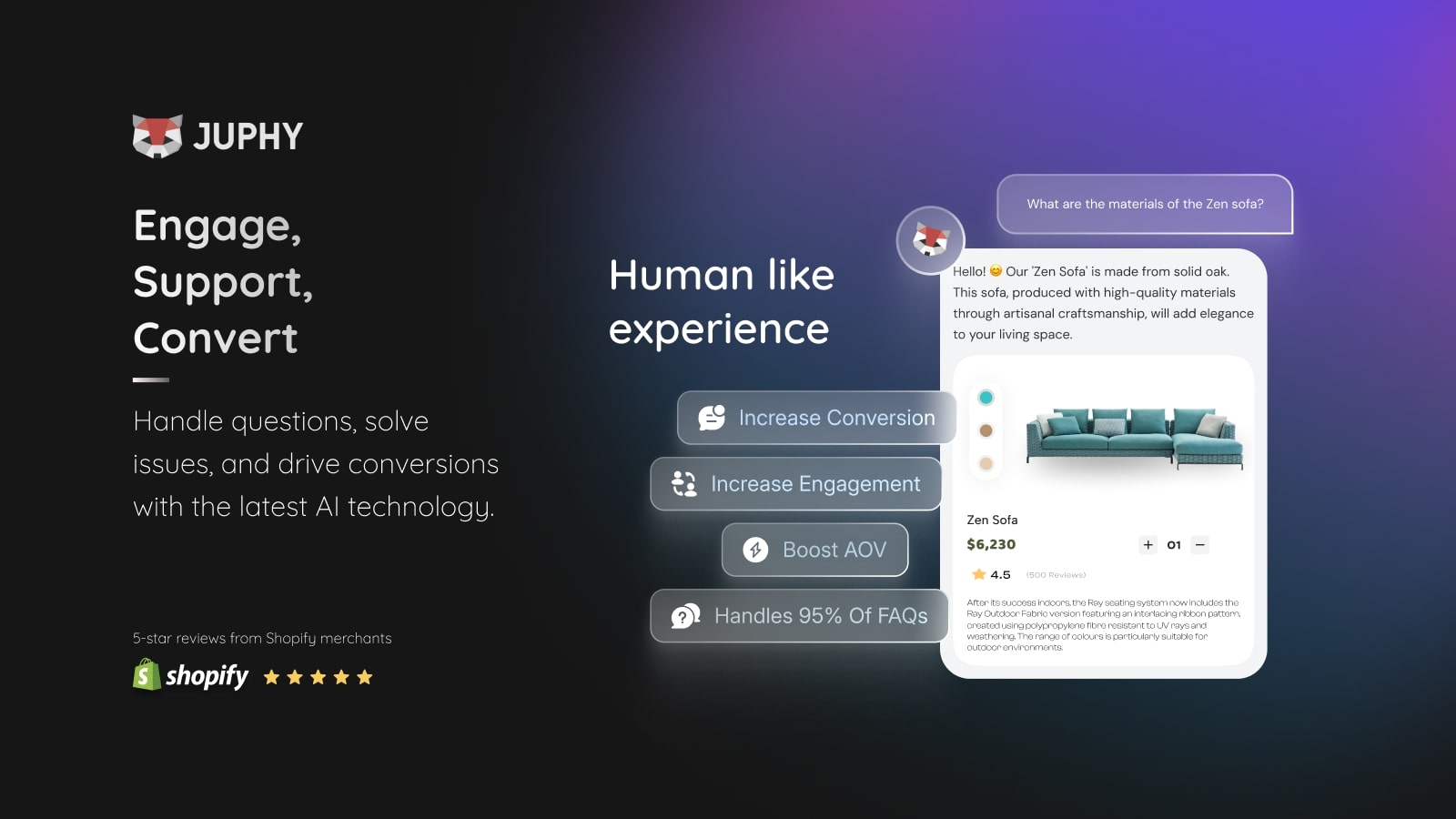Juphy’s Weekly E-Commerce News Express – 18-22 March 2024
Ceyda Duz
Welcome to last week’s roundup of e-commerce and AI highlights! In this edition, we share insights about the role of e-commerce platforms for SMBs and the opportunities and challenges of AI in retail. Next, we share an exciting product update from Walmart and a strategic partnership between WooCommerce and Fortis. Feeling curious about what is going on in the world of retail? Keep on reading to stay updated, and don’t miss out on hot topics!

The Role of E-Commerce Platforms for SMBs in Global Trade
E-commerce platforms have become essential to various forms of commerce, especially in recent years, increased by the pandemic and lifestyle shifts. A recent survey by FedEx and Morning Consult underlines the vital role of these platforms in facilitating global trade for SMBs. Out of 1,000 SMBs surveyed, over 90% recognized the role of e-commerce platforms in establishing global trade, viewing them as essential for business growth. Moreover, 86% of respondents highlighted the significance of global trade in driving their businesses forward.

Despite the undeniable benefits, SMBs encounter various challenges, particularly concerning shipping delays and disruptions due to geopolitical issues – a primary barrier reported by 84% of respondents. Additionally, more than two-thirds of SMB executives depend on imported goods for production or distribution, emphasizing the interconnectedness of global supply chains. The capability to directly import from overseas not only strengthens their operations but also sustains employment opportunities, as stated by 82% of respondents.
Reviewing the past decade, there has been a noticeable change in how business leaders perceive global trade. Most now see it as important for key topics that make a business a business: growth, job opportunities, and innovation. This shift highlights the importance of adapting to economic changes and investing in ongoing training for employees. Almost all participants, 95% of surveyed SMBs, support prioritizing job training to ensure workers have the skills required to compete globally.

The survey, done by Morning Consult, reveals how SMB leaders view the impact of economic, trade, and technology on growth. It highlights the big role of e-commerce platforms, like Shopify, and online marketplaces, such as Amazon, in helping SMBs expand internationally.
Overall, this survey and many other research and studies done in this area show how e-commerce platforms have become essential for SMBs concerning international expansion. As 2024’s trend would suggest, to manage trade complexities and foster growth, businesses must start to think of implementing technology, especially AI, to see the results they anticipate.
Generative AI: Opportunities and Challenges for Retailers
The adoption of generative AI is gaining momentum among retailers, marking this year as the era of AI in retail. This shift towards innovative technology presents opportunities for retailers to enhance both customer experience and operational efficiency. However, according to a recent report by Salesforce and the Retail AI Council, retailers often face challenges in fully using the potential of this technology. It’s understandable, given that the hype is still in its early stages, and AI continues to evolve over time. While AI holds significant promise in shaping the future of retail, it’s crucial to recognize that it’s still in a developmental phase, with much to explore and learn along the way.

On a positive note, recent survey findings reveal a growing willingness among retailers to embrace generative AI for personalization efforts, with 93% already incorporating it in some capacity. Moreover, 81% of respondents have allocated a portion of their budget specifically for AI usage, with around 50% setting it aside for special generative AI applications. Presently, popular use cases include leveraging AI for quick, personalized responses and deploying digital shopping assistants to guide customers through their shopping journey.

Despite the excitement for generative AI and the eagerness to use it, retailers face challenges with data that impact its effectiveness. Only 17% have a complete view of customer data, which is important for getting the most out of AI insights. Challenges include fragmented and messy data, making it difficult for retailers to organize and leverage their information efficiently. Furthermore, ethical concerns are significant in adopting generative AI, as just 13% of customers fully trust companies to use AI ethically. Retailers understand the need to adhere to ethical and security standards to address worries about biased, misleading, or harmful AI outcomes.
As a response to this concern, retailers are more and more focusing on transparency, data security, and privacy to address ethical concerns and earn consumer trust. Thinking of it as a marathon, we are just at the beginning and have a long way to go in all things retail AI. The important thing to keep in mind is to be patient and always look at the big picture while thinking of generative AI. After all, new things are always more difficult than things we are used to!
Walmart’s AI Logistics Solution: Route Optimization

Walmart introduced Route Optimization, an AI-driven logistics platform available as a SaaS solution. It helps businesses optimize their driving routes, pack trailers efficiently, and minimize miles traveled. By avoiding unnecessary miles and bypassing inefficient paths, companies have reduced carbon emissions.
Fortis & WooCommerce Partner for B2B Payments
Fortis, a payment and commerce technology provider, has joined forces with WooCommerce to integrate B2B payment functionality into the WooCommerce platform. This partnership extends Fortis’s back-office ecosystem while enhancing the capabilities of WooCommerce for B2B transactions. As part of this collaboration, Fortis will debut as a verified payments app in both the WooCommerce Marketplace and the WordPress Plugins Marketplace, offering users seamless access to advanced payment solutions tailored for B2B commerce.

Maximizing Sales Round-the-Clock with Juphy AI
Did you know that nearly 60% of online shoppers purchase after midnight? For online businesses, capturing these late-night sales can be challenging, especially when operating across different time zones. However, with Juphy AI’s Agent, you can ensure that your Shopify store is always open for business, regardless of the hour. Juphy AI’s Agent is like having a dedicated shopping assistant available 24/7.
Whether it’s providing personalized product recommendations, assisting with FAQs, or common queries, Juphy’s ChatGPT-powered AI Agent is designed to enhance the shopping experience for your customers. By simply integrating Juphy AI with your Shopify store, you can effortlessly extend your business hours and capture sales opportunities round-the-clock. From fashion to electronics and even handling returns and refunds, Juphy’s AI Agent ensures that every customer interaction is seamless and memorable even while you sleep.
Try Juphy AI out now: apps.shopify.com/juphy

Key Takeaways
E-Commerce Platforms for SMBs: E-commerce platforms are crucial for SMBs’ global trade, with over 90% recognizing their importance. Challenges like shipping delays highlight the need for technology adoption, particularly AI, to enhance efficiency.
Generative AI in Retail: Generative AI adoption is rising in retail, offering improved customer experiences and operational efficiency. However, challenges like data fragmentation and ethical concerns need to be addressed for full potential realization.
Walmart’s Route Optimization: Walmart’s AI-driven Route Optimization minimizes carbon emissions by optimizing driving routes and trailer packing. This innovative solution contributes to sustainability while enhancing operational efficiency.
Fortis & WooCommerce Partnership: The partnership integrates B2B payment functionality into WooCommerce, streamlining transactions and expanding market reach. Businesses benefit from enhanced payment processing capabilities and improved market accessibility.

